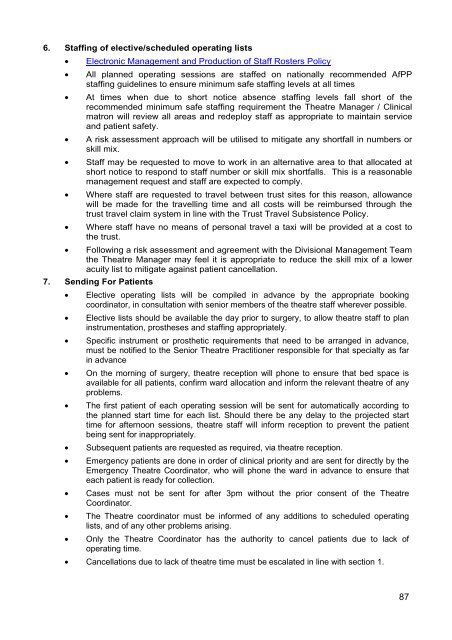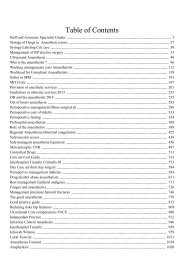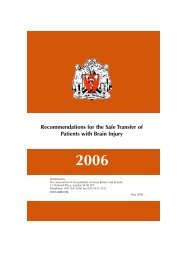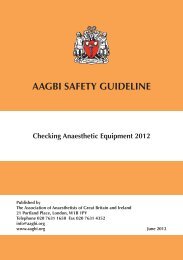TheatrePracticeStandardsGeneric1
Create successful ePaper yourself
Turn your PDF publications into a flip-book with our unique Google optimized e-Paper software.
6. Staffing of elective/scheduled operating lists<br />
• Electronic Management and Production of Staff Rosters Policy<br />
• All planned operating sessions are staffed on nationally recommended AfPP<br />
staffing guidelines to ensure minimum safe staffing levels at all times<br />
• At times when due to short notice absence staffing levels fall short of the<br />
recommended minimum safe staffing requirement the Theatre Manager / Clinical<br />
matron will review all areas and redeploy staff as appropriate to maintain service<br />
and patient safety.<br />
• A risk assessment approach will be utilised to mitigate any shortfall in numbers or<br />
skill mix.<br />
• Staff may be requested to move to work in an alternative area to that allocated at<br />
short notice to respond to staff number or skill mix shortfalls. This is a reasonable<br />
management request and staff are expected to comply.<br />
• Where staff are requested to travel between trust sites for this reason, allowance<br />
will be made for the travelling time and all costs will be reimbursed through the<br />
trust travel claim system in line with the Trust Travel Subsistence Policy.<br />
• Where staff have no means of personal travel a taxi will be provided at a cost to<br />
the trust.<br />
• Following a risk assessment and agreement with the Divisional Management Team<br />
the Theatre Manager may feel it is appropriate to reduce the skill mix of a lower<br />
acuity list to mitigate against patient cancellation.<br />
7. Sending For Patients<br />
• Elective operating lists will be compiled in advance by the appropriate booking<br />
coordinator, in consultation with senior members of the theatre staff wherever possible.<br />
• Elective lists should be available the day prior to surgery, to allow theatre staff to plan<br />
instrumentation, prostheses and staffing appropriately.<br />
• Specific instrument or prosthetic requirements that need to be arranged in advance,<br />
must be notified to the Senior Theatre Practitioner responsible for that specialty as far<br />
in advance<br />
• On the morning of surgery, theatre reception will phone to ensure that bed space is<br />
available for all patients, confirm ward allocation and inform the relevant theatre of any<br />
problems.<br />
• The first patient of each operating session will be sent for automatically according to<br />
the planned start time for each list. Should there be any delay to the projected start<br />
time for afternoon sessions, theatre staff will inform reception to prevent the patient<br />
being sent for inappropriately.<br />
• Subsequent patients are requested as required, via theatre reception.<br />
• Emergency patients are done in order of clinical priority and are sent for directly by the<br />
Emergency Theatre Coordinator, who will phone the ward in advance to ensure that<br />
each patient is ready for collection.<br />
• Cases must not be sent for after 3pm without the prior consent of the Theatre<br />
Coordinator.<br />
• The Theatre coordinator must be informed of any additions to scheduled operating<br />
lists, and of any other problems arising.<br />
• Only the Theatre Coordinator has the authority to cancel patients due to lack of<br />
operating time.<br />
• Cancellations due to lack of theatre time must be escalated in line with section 1.<br />
87





